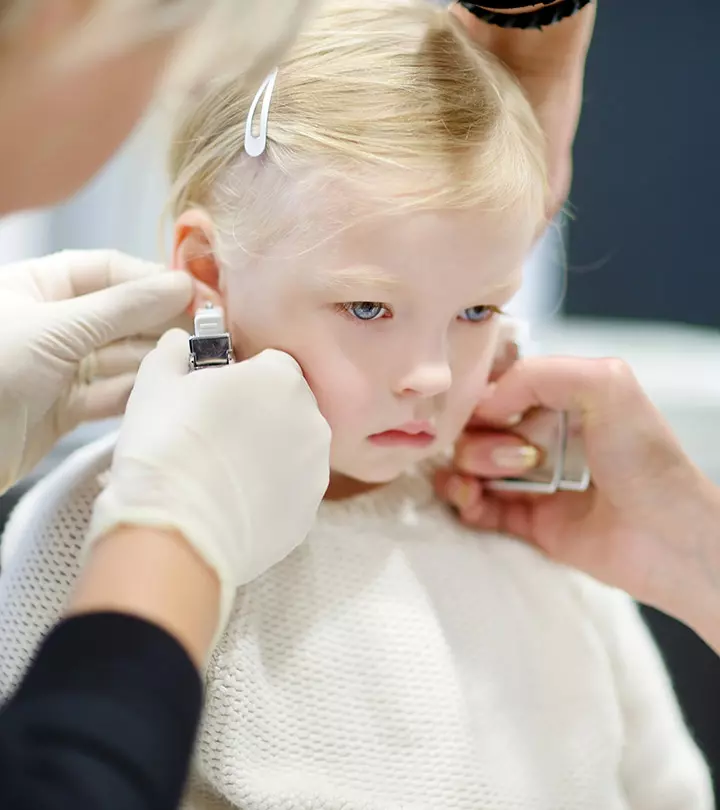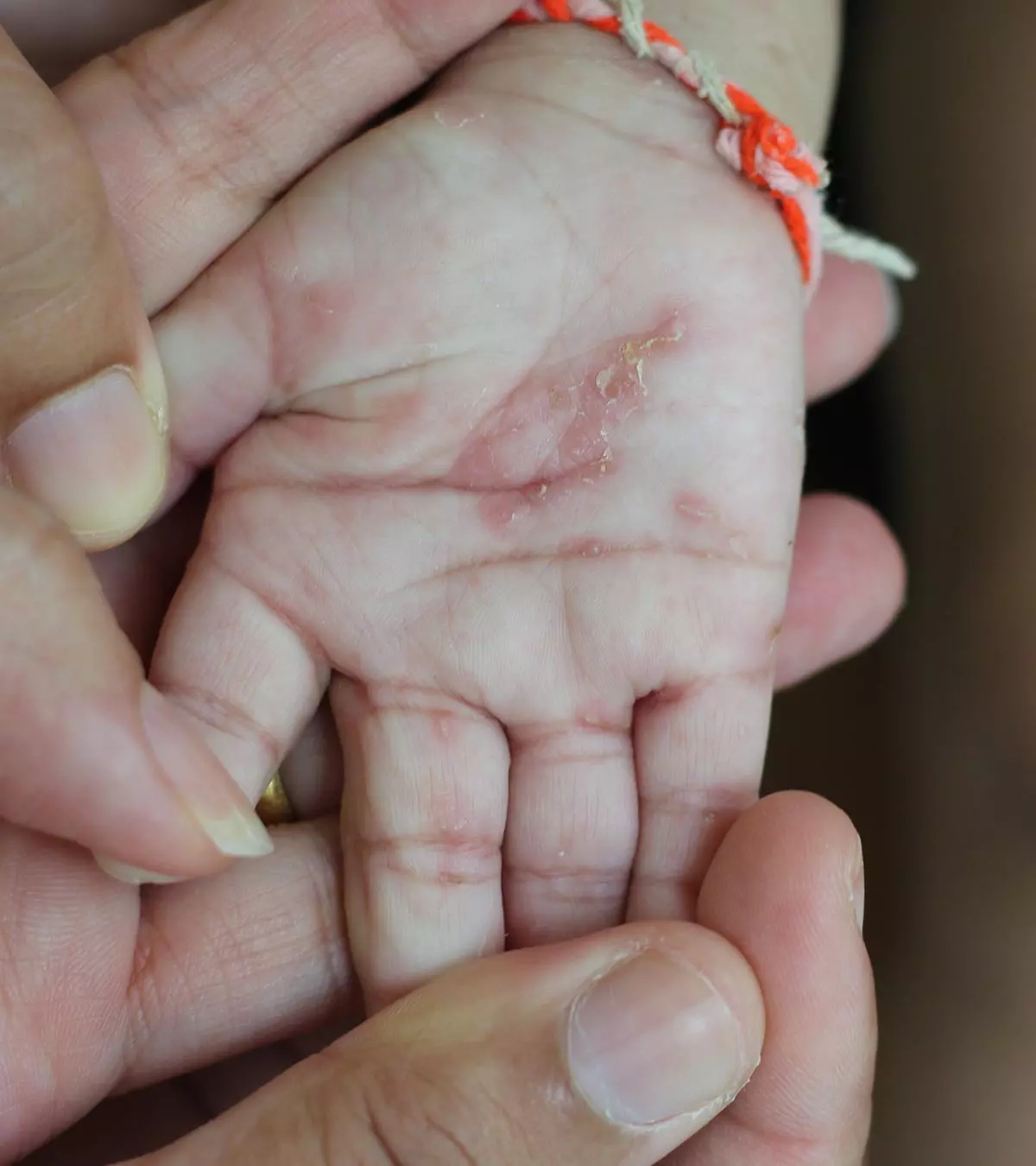
Image: iStock
TikTok is a fast-growing social media app used for uploading and sharing short videos of 60 seconds. Though it is widely popular, is TikTok safe for kids?
Although people of all ages use TikTok, its short video format particularly attracts youngsters, including children under 13, who may be exposed to mature content and privacy issues. TikTok was formed by merging two popular apps, Douyin and Musical.ly, in 2018. After this merger, the social media platform has gathered more than 800 million active users. In addition, TikTok is available in 75 languages and 150 markets worldwide (1) (2).
Read this post to learn about the risks of TikTok for kids and the safety measures to consider while using it.
Key Pointers
- TikTok is not considered safe for children and must never be used without parental supervision.
- According to the app’s conditions, the minimum age for using the app is 13 years.
- Using this app may lead to risks such as connecting with strangers, participating in dangerous challenges, and sharing personal data.
Is TikTok Safe For Kids?

Image: Shutterstock
TikTok is not considered completely safe for children, but the app is appealing to them as it allows free expression in creative ways. They can create videos on any topic, ranging from sports and fitness to recipes and DIY tutorials. However, TikTok requires adult supervision and a private account for the following reasons (3)(4):
- Children often encounter inappropriate user-generated content that portrays offensive language and actions even after filtering the content.
- Strangers are always looking to connect with children on TikTok, and this may be a safety concern.
- TikTok has a commercial element that offers reward points if children invite their friends to download the app. These points can be redeemed for coupons from different brands.
 Quick fact
Quick factHow Old Do You Have To Be To Use TikTok?

Image: Shutterstock
According to TikTok’s terms and conditions, the minimum age for using the app is 13 years. However, younger children can access a restricted version of the platform. Here are the different rules for users of different ages (3):
- Children under 13 years: They can only use the app section meant for younger children. This section has extra privacy, age restrictions, and safety features that allow them to watch age-appropriate content, and it does not allow them to post, search, or comment on any video.
- Children between 13 and 15 years: Their accounts are private by default, and only their friends can engage with their videos. The feature that suggests their account to others is also turned off. Additionally, TikTok’s new update prevents notifications from being sent to users in this age group after 9 pm.
- Children above 16 years: They can use the live entertainment stream and direct messaging features. However, users aged 16–17 will not receive notifications after 10 pm. Only users above 18 can purchase, send, and receive virtual gifts.
TikTok has become a sensation, especially among teens, as it has become mainstream. According to Piper Sandler’s bi-annual survey, TikTok currently ranks the third most popular social media platform among American teenagers. As the below graph depicts, nearly 70 percent of US teens use TikTok at least once a month, with Instagram and Snapchat being the most used social media apps.

70% of teens use tiktok atleast once a month
Source: 7 in 10 American Teens Use TikTok; Statista/Piper SandlerWhat Are The Risks Of TikTok For Kids?

Image: Shutterstock
Since TikTok is a social platform, it poses some risks for children. These risks include (3)(5)
- Connecting with strangers: Social platforms allow users to connect with strangers. Although there is no harm in building new connections, TikTok predators connect with children with bad intentions.
To check this concern, TikTok has set safety guidelines that prevent strangers from sending inappropriate messages to children. Additionally, children under 16 years are not allowed to send or receive any private messages. Unfortunately, many children use TikTok with a false date of birth, causing their safety to be at risk.
- Collection of data: Earlier, TikTok had been blamed for illegally collecting the data of children less than 13 years old and fined $5 million by the US Federal Trade Commission (6). Therefore, children must avoid sharing and storing their personal information on TikTok for the purposes of personal and digital safety.
- Dangerous challenges: All social and online platforms regularly come up with different challenges. In the past, TikTok had introduced some dangerous challenges, such as the Skull breaker Challenge and Blackout Challenge. Taking part in such challenges can be risky. Hence, children must avoid such challenges and avoid being influenced by peer pressure.
- Addiction: The app is made in such a way that children tend to spend a lot of time using it. This is one of the most concerning effects of social media on children. The ‘For you’ stream created by artificial intelligence is one factor that makes the app addictive. The developers also frequently change the app’s layout, add new features, and present content based on the users’ likes, comments and reshares which makes the app appear more relatable and interesting. This app addiction can hence affect a child’s mental and physical health (7).
 Research finds
Research findsWhat Do Parents Need To Know About TikTok For Kids?

Image: Shutterstock
If your child is using TikTok, you need to be aware of certain facts that might help ensure their safety. Some of these facts are listed below (4) (6) (8):
- Your child can open a TikTok account using their existing Google, Facebook, or email accounts, posing a greater risk of shared personal information.
- There are chances that inappropriate content (mature content) may crop up on your child’s profile even after applying the internet safety and privacy settings. Exposure to such content can negatively affect children.
- Certain conversations on sensitive topics, such as politics, racism, and violence, can affect your child’s mental health.
- Friends and other people on the app might force your child to develop better content.
- Your child may become a target of online bullying or cyberbullying as users may criticize their content, which might affect their self-confidence.
- The child may develop body image issues or problems with their self-esteem.
 Did you know?
Did you know?What Safety Measures Should Be Taken While Using TikTok?

Image: Shutterstock
Social media platforms offer a fun way to express creativity, so it is not wrong for your child to want to use them. However, it may be necessary to enable parental controls over the app’s usage to monitor your child’s activity closely from time to time. Some of the safety measures to follow are explained below (3) (9) (10):
- Set screen time limits: You can use TikTok’s Screen Time Management feature to limit your child’s watch time. Set the time limit to 40 minutes, after which the app will request a passcode to continue using it.
- Enable restricted mode: This feature limits mature content from appearing on your child’s screen, but it is not foolproof. Any inappropriate content that appears in this mode can be reported.
- Enable family pairing: For additional privacy, you could use the Family Pairing setting, where you create your TikTok account and link it with your child’s account. It will enable you to manage your child’s privacy settings.
- Monitor your child’s activity: To keep an eye on the content your child is viewing, you should share a TikTok account with your child. However, if your child is apprehensive about this idea, try talking about their favorite music, videos, and creators on TikTok. They may be more comfortable if you have an idea of what content they enjoy.
- Make the account private: Encourage your child to keep their account private for cyber safety purposes and to protect them from strangers and predators. However, even in private accounts, the profile photo, bio, and username are visible. Hence, ensure they share no sensitive information in this section.
- Control video settings: Even when your child’s account is public, they can change the settings of each video and decide who can watch them. Encourage your child to use this option to manage their viewers and video-sharing provisions.
- Report and block users: If children face problems with anything related to the content or settings of the app, they can immediately report the issue. They can also easily block the users whose content they do not want to see.
Frequently Asked Questions
1. What is the version of TikTok for younger children?
There is no specific child version of TikTok. However, there’s a younger user section of the app, which allows children under 13 to access videos curated by TikTok’s algorithm for a younger audience. The restricted mode can also be turned on if the child uses it frequently.
2. Which is the most child-friendly social media app?
Many child-friendly social networking media apps help them engage with friends and share experiences online. Some include Edmodo, Club Penguin Island, PopJam, and Kinzoo Family Messenger. Children can interact and build their social networks, play safely and responsibly online, and be a part of a good community. Some of the apps also help students and teachers to connect and share information about the school.
3. Can I block TikTok on my child’s phone?
If TikTok is exposing the child to violence, suggestive themes, and explicit content, it is best to turn on the restricted mode. To do so, go to the child’s profile page, tap the three dots at the top-right, select Digital Wellbeing, and tap restricted mode. It is also possible to turn on family pairing on the app.
There may not be a clear and confirmed answer to your question– “Is TikTok safe for kids?”. Media platforms such as TikTok can have both positives and negatives, and you need to ensure that children only gain the positives by taking necessary precautions. Monitor their activity and the type of content they watch and report any unfriendly behavior to maintain online safety. Be good role models for your children so they learn to use such apps safely.
Infographic: Safety Measures When Using TikTok
TikTok has gained massive popularity among social media users, and a large chunk of them are children. It is crucial to ensure your child is safe from strangers and online predators when using such social media platforms. Check out the infographic below for practical ways to achieve the same.

Illustration: Momjunction Design Team
Illustration: Is TikTok Safe For Kids? What Parents Need To Know

Image: Dall·E/MomJunction Design Team
Know about the potential risks and dangers that tiktok might pose for your little ones and tips to manage the situation, in this video.
References
- New Platform Old Problems: How TikTok Recreates the Regulatory Challenges That Came Before It.
https://www.cigionline.org/articles/new-platform-old-problems-how-tiktok-recreates-regulatory-challenges-came-it/ - Banning apps like TikTok is a slippery slope. Here’s why.
https://www.weforum.org/stories/2020/11/banning-apps-like-tiktok-slippery-slope/ - Parent’s Ultimate Guide to TikTok.
https://www.commonsensemedia.org/articles/parents-ultimate-guide-to-tiktok-2024?overridden_route_name=entity.node.canonical&base_route_name=entity.node.canonical&page_manager_page=node_view&page_manager_page_variant=node_view-panels_variant-csm_blog&page_manager_page_variant_weight=-6 - Tiktok app safety: What parents need to know.
https://www.internetmatters.org/advice/apps-and-platforms/social-media/tiktok/ - Parent’s Guide to TikTok.
https://bulletin.punahou.edu/parents-guide-to-tiktok/ - TikTok: Transforming Video-Sharing.
https://d3.harvard.edu/platform-digit/submission/tiktok-transforming-video-sharing/ - What Makes TikTok so Addictive?: An Analysis of the Mechanisms Underlying the World’s Latest Social Media Craze.
https://sites.brown.edu/publichealthjournal/2021/12/13/tiktok/ - Living in a Moment: Impact of TicTok on Influencing Younger Generation into Micro-Fame.
https://www.amity.edu/gwalior/jccc/pdf/jccc-12-19-19.pdf - TikTok Privacy Settings.
https://www.internetmatters.org/parental-controls/social-media/tiktok-privacy-and-safety-settings/ - The 101 on TikTok for parents – CASE NEWS (fiu.edu).
https://casenews.fiu.edu/2021/01/03/the-101-on-tiktok-for-parents/ - More Americans – especially young adults – are regularly getting news on TikTok.
https://www.pewresearch.org/short-reads/2024/09/17/more-americans-regularly-get-news-on-tiktok-especially-young-adults/
Community Experiences
Join the conversation and become a part of our nurturing community! Share your stories, experiences, and insights to connect with fellow parents.
Read full bio of Dr. Holly Schiff
Read full bio of Pragya Bhargavi
Read full bio of Dr. Ritika Shah
Read full bio of Kavita Kankani



















